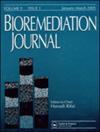实验室规模的生物修复技术:黄曲霉USM-AR1对废食用油的脱除和生物降解
IF 1.4
4区 环境科学与生态学
Q3 ENVIRONMENTAL SCIENCES
引用次数: 0
摘要
摘要居住区产生的大量废弃食用油如果处理不当,可能会对环境造成不利影响。真菌由于其生理和对环境的适应,对碳氢化合物的毒性具有更高的耐受性。因此,它们可以用于生物修复,以减少废油释放到环境中。本工作旨在利用新分离的黄曲霉USM-AR1菌株,在搅拌槽反应器(STR)中对废弃食用油进行生物去除和生物降解。该菌株对废弃食用油具有显著的去除活性。在培养的第3天,废弃食用油的去除率达到97%。当培养物在400下搅拌时达到这一点 rpm,保持摇瓶培养物中获得的雷诺数。幸运的是,废食用油的最佳分散度也在400 rpm。在培养的第3天观察到最高的细胞表面疏水性(MATH)为76.42%。最大的生物表面活性剂和乳化活性出现在培养的第2天,分别为43 mm和44%。黄曲霉USM-AR1菌株产生的细胞表面疏水性和生物表面活性剂在废食用油的生物去除中发挥了重要作用,使该菌株成为处理废弃食用油的潜在候选菌株。本文章由计算机程序翻译,如有差异,请以英文原文为准。
Lab-scale bioremediation technology: Ex-situ bio-removal and biodegradation of waste cooking oil by Aspergillus flavus USM-AR1
Abstract Large amounts of waste cooking oil from residential areas can cause adverse effect on the environment if not disposed properly. Fungi have a higher tolerance to hydrocarbon toxicity due to their physiology and adaptation to the environment. Consequently, they can be employed in bioremediation to reduce waste oils release to the environment. This work aims to bio-remove and biodegrade the waste cooking oil using a newly isolated strain Aspergillus flavus USM-AR1, in stirred tank reactor (STR). The strain showed remarkable removal activity of waste cooking oil. The removal efficiency of waste cooking oil reached 97% on day 3 of cultivation. This was attained when the culture was agitated at 400 rpm, maintaining the Reynold’s number of that obtained in the shake flask culture. Fortuitously, the best dispersion of waste cooking oil was also obtained at 400 rpm. The highest cell surface hydrophobicity (MATH) at 76.42% was observed at day 3 of cultivation. The maximum biosurfactant and emulsification activity occurred at day 2 of cultivation, which were 43 mm and 44%, respectively. Cell surface hydrophobicity and biosurfactant produced by strain Aspergillus flavus USM-AR1 played an important role in bio-removal of waste cooking oil, making this strain a prospective candidate for treating waste cooking oil.
求助全文
通过发布文献求助,成功后即可免费获取论文全文。
去求助
来源期刊

Bioremediation Journal
ENVIRONMENTAL SCIENCES-
CiteScore
5.30
自引率
0.00%
发文量
36
审稿时长
9 months
期刊介绍:
Bioremediation Journal is a peer-reviewed quarterly that publishes current, original laboratory and field research in bioremediation, the use of biological and supporting physical treatments to treat contaminated soil and groundwater. The journal rapidly disseminates new information on emerging and maturing bioremediation technologies and integrates scientific research and engineering practices. The authors, editors, and readers are scientists, field engineers, site remediation managers, and regulatory experts from the academic, industrial, and government sectors worldwide.
High-quality, original articles make up the primary content. Other contributions are technical notes, short communications, and occasional invited review articles.
 求助内容:
求助内容: 应助结果提醒方式:
应助结果提醒方式:


